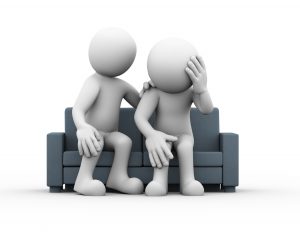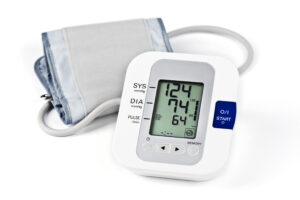Mood and anxiety symptoms are commonly observed following brain injury and may occur in the context of adjustment difficulties. If symptoms persist, consideration should be given to treatment with antidepressant medication and/or psychological treatment (see below).
The person with significant cognitive impairment should be regularly orientated to their circumstances and the impact of their neurological impairments in order to support psychological adjustment.
Mild symptoms of low mood, which do not significantly impact on day-to-day functioning,  can often be managed without medication or psychological treatment. The person’s mental state should be monitored and if there is evidence of deterioration in mood, treatment for depression may be indicated.
can often be managed without medication or psychological treatment. The person’s mental state should be monitored and if there is evidence of deterioration in mood, treatment for depression may be indicated.
Psychological treatment may also be helpful. Group-based or individual psychotherapy such as cognitive behavioural therapy (CBT), or interpersonal therapy (IPT) may be helpful. Following brain injury, communication and/or cognitive impairments may make it difficult for the person to engage with psychological treatment.
 It may be difficult to judge the severity of depression arising during recovery following a severe brain injury. Where there is a suspicion of a depressive disorder, then a trial of antidepressant medication is reasonable. Selective Serotonin Reuptake Inhibitor (SSRI) medications (e.g. Fluoxetine, Paroxetine, Sertraline, Citalopram, Escitalopram) are often the first line in the treatment of depression. Sertraline should be commenced at 50 mg daily, increasing to a dose of 150-200 mg daily over 3-4 weeks in weekly increments of 50 mg. This is generally well tolerated. Side effects may include anxiety/agitation and nausea, both generally self-limiting. Adverse effects on sexual functioning may occur (e.g. decreased libido, impotence).
It may be difficult to judge the severity of depression arising during recovery following a severe brain injury. Where there is a suspicion of a depressive disorder, then a trial of antidepressant medication is reasonable. Selective Serotonin Reuptake Inhibitor (SSRI) medications (e.g. Fluoxetine, Paroxetine, Sertraline, Citalopram, Escitalopram) are often the first line in the treatment of depression. Sertraline should be commenced at 50 mg daily, increasing to a dose of 150-200 mg daily over 3-4 weeks in weekly increments of 50 mg. This is generally well tolerated. Side effects may include anxiety/agitation and nausea, both generally self-limiting. Adverse effects on sexual functioning may occur (e.g. decreased libido, impotence).
If a trial of one SSRI is ineffective (taken consistently at an adequate dose for at least four weeks), a trial of a different SSRI may be indicated. If unsuccessful, then the next step would usually be a dual-acting antidepressant drug (i.e. acting on both serotonin and noradrenaline) such as Mirtazapine, Venlafaxine or Duloxetine.
 Mirtazapine is best taken at bed time as it has sedative properties. Mirtazapine is associated with increased appetite and weight gain. It may also be associated with gastrointestinal side effects and sexual dysfunction. The side effects of Venlafaxine are generally similar to SSRIs and include nausea (less so when prescribed in modified release formulation), anxiety and sexual dysfunction. As hypertension may occur, blood pressure should be checked before commencing treatment and ongoing monitoring is recommended.
Mirtazapine is best taken at bed time as it has sedative properties. Mirtazapine is associated with increased appetite and weight gain. It may also be associated with gastrointestinal side effects and sexual dysfunction. The side effects of Venlafaxine are generally similar to SSRIs and include nausea (less so when prescribed in modified release formulation), anxiety and sexual dysfunction. As hypertension may occur, blood pressure should be checked before commencing treatment and ongoing monitoring is recommended.
Duloxetine has a similar side effect profile to Venlafaxine but has additional benefits in the treatment of chronic and neuropathic pain.
Where depression does not respond to an adequate trial of an SSRI followed by an adequate trial of Mirtazapine, Venlafaxine or Duloxetine, alternative treatments can be considered i.e. various drug combinations and augmentative strategies are available but should be carried out under the supervision of a Consultant Psychiatrist.
Tricyclic antidepressants (e.g. Amitriptyline, Nortriptyline, Clomipramine, Lofepramine and Imipramine), although very effective, can be associated with anticholinergic side effects including dry mouth, blurred vision, drowsiness and postural hypotension with consequent risk of falls. Tricyclic antidepressants reduce seizure threshold and therefore should be avoided where there is a diagnosis of epilepsy. They can also cause prolongation of the QTc interval on ECG, with risk of fatal ventricular tachyarrythmias. They are highly toxic in an overdose situation. Tricyclic antidepressants are best avoided after a significant brain injury.